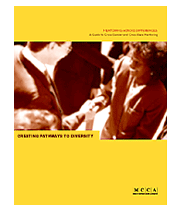Mentoring Across Differences: A Guide to Cross-Gender and Cross-Race Mentoring

Studies of the legal profession consistently show that one of the significant barriers to the advancement of women and minority lawyers is the inability of these lawyers to find mentors. This study, conducted by Ida Abbott and Dr. Rita Boags for the Minority Corporate Counsel Association (MCCA), looked at women and minority lawyers in law firms and corporate law departments who had successful mentoring relationships. We wanted to learn how these lawyers found, formed, and sustained meaningful mentoring relationships across gender and race. The study results have significant implications for law firm diversity efforts and for individual lawyers of both genders and all races.
Here are a few of our key findings:
- Women and minority lawyers who understood the value of mentoring and actively sought mentors were able to find mentors to meet various needs and goals throughout their careers.
- While lawyers preferred informal mentoring, 90% of participants who were matched in formal mentoring programs were satisfied with their mentoring experience.
- Mentors viewed their time and energy as expensive assets and the mentoring process as an investment of those assets. They invested in lawyers who they believed would produce a high return, i.e., those whom they saw as “winners” or “keepers.”
- Many women and minority lawyers were not aware of what potential mentors expected from them. This lack of knowledge may be one of the key reasons why women and minority lawyers do not experience mentoring to the same degree as white men.
- Mentoring programs and diversity initiatives helped create an environment that fostered cross-gender and cross-race mentoring. However, participants felt that firms did not provide adequate guidelines, training, or coordination of these programs and initiatives.
In addition to discussing the study’s findings and their implications, Mentoring Across Differences presents practical recommendations for lawyers who wish to have mentors; for mentors of women and minority lawyers; and for legal employers who wish to promote mentoring in their organizations. The study has received national attention and was mentioned in the New York Times athttp://www.nytimes.com/2004/01/18/jobs/18exli.html.
